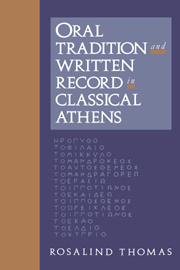Book contents
- Frontmatter
- Contents
- Acknowledgements
- Abbreviations
- Introduction
- 1 LITERACY, WRITTEN RECORD AND ORAL COMMUNICATION
- 2 FAMILY TRADITION
- 3 GENEALOGY AND FAMILY TRADITION: THE INTRUSION OF WRITING
- 4 OFFICIAL TRADITION? POLIS TRADITION AND THE EPITAPHIOS
- 5 THE LIBERATION OF ATHENS AND THE ‘ALCMAEONID TRADITION’
- Epilogue
- Appendix: Early Greek lists
- Chronological table
- Bibliography
- Index
1 - LITERACY, WRITTEN RECORD AND ORAL COMMUNICATION
Published online by Cambridge University Press: 03 December 2009
- Frontmatter
- Contents
- Acknowledgements
- Abbreviations
- Introduction
- 1 LITERACY, WRITTEN RECORD AND ORAL COMMUNICATION
- 2 FAMILY TRADITION
- 3 GENEALOGY AND FAMILY TRADITION: THE INTRUSION OF WRITING
- 4 OFFICIAL TRADITION? POLIS TRADITION AND THE EPITAPHIOS
- 5 THE LIBERATION OF ATHENS AND THE ‘ALCMAEONID TRADITION’
- Epilogue
- Appendix: Early Greek lists
- Chronological table
- Bibliography
- Index
Summary
Literacy in ancient Greece
A discussion of oral tradition, and still more of its interaction with written record, seems to raise questions about the extent of literacy. For how can we talk of oral tradition in classical Athens in the fifth and fourth centuries when the written word was so plentiful? What are we suggesting about the level of literacy? It is often loosely assumed that oral tradition dies out when literacy becomes widespread. ‘Oral’ and ‘literate’ are often seen as opposed characteristics. Romantic views of ‘oral society’ convey a seductive picture of an intimate ‘folk-culture’ which is shattered by the insidious arrival of literacy. Behind these views lie certain expectations of literacy and ideas about its use which we are encouraged to take for granted by our sophisticated and highly literate standpoint.
In fact the society of classical Athens was still heavily dependent on the spoken word even in the fourth century B.C. One can still talk plausibly of oral tradition in that century (Chs. 2, 4). Yet the alphabet reached Greece in the eighth century B.C. Many postulate widespread literacy in Athens at least by the fifth century. Other theories assume an extreme picture of Greece as an ‘oral society’, and the extent of ‘literacy’ is accordingly minimized. The two pictures would seem to be incompatible. Yet surely the continuation of certain oral practices into the fourth century suggests first that the reality was a great deal more complex; and secondly that we are thinking about literacy and lack of it in a misleading way, influenced by our own preconceptions about literacy.
- Type
- Chapter
- Information
- Oral Tradition and Written Record in Classical Athens , pp. 15 - 94Publisher: Cambridge University PressPrint publication year: 1989
- 1
- Cited by



